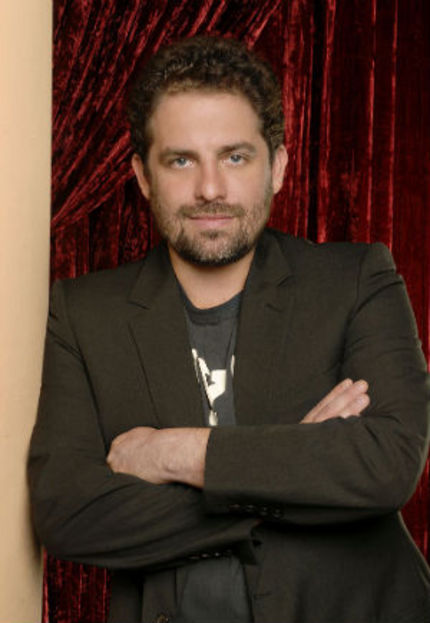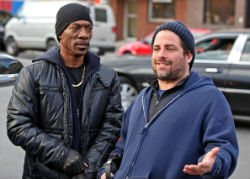Hollywood Grind: Brett Ratner and the Knee-Jerk Reaction

Hollywood Grind is a column that examines filmmakers working within the studio system to produce and/or distribute their work.
Within the past month, advance word on Tower Heist hinted that it was a return to form for director Brett Ratner and star Eddie Murphy, that the subject matter resonated with audiences, and that it could do some major business. This was surprising to hear, since the trailer looked "horribly awful," as our own Todd Brown observed. The reality fell somewhere in the middle, populated with underdrawn characters and outlandish situations, too unrealistic to be taken seriously and not pushed far enough into cartoon-land to be enjoyed as a successful fantasy.
The U.S. box office has now spoken, and the public was sufficiently interested to make it the #2 earner, well behind behind family-friendly Puss in Boots. The audience demographics were a bit older, with 62% of the audience 30 years of age or older, and 56% female, according to Movie City News. In comparison, A Very Harold and Kumar 3D Christmas reached the younger crowd, with a majority of its audience under the age of 25.
While it makes sense that the third installment of the rollicking Harold and Kumar pot humor series would draw a smaller, younger crowd, what's surprising is that Tower Heist appealed to an audience that, for the most part, doesn't go to the movies every week. As it's been pounded into our heads for years, the biggest percentage of opening weekend is reliant on younger people between the ages of 17-25, the kids with disposable income who want to go out with their friends every weekend and will see whatever looks best that particular weekend, the kids who don't care about critics and just want to have a good time.
Except when they smell a stinker and would rather go directly to bars and clubs, or stay home and play video games.
As with all generalizations, it's dangerous to make assumptions, but I'm fascinated by Tower Heist, mostly because it was directed by Brett Ratner. The merest mention of his name causes me to recoil in horror, as though he has done me some personal injury. My knee-jerk, negative reaction is triggered by memories of films he's directed over the past 11 years: The Family Man, Red Dragon, X-Men: The Last Stand, and Rush Hour 3.
That collection of product epitomizes the worst excesses of the studio system. Red Dragon is a childish version of the Thomas Harris novel, replacing the intense, haunting subtlety of Michael Mann's superior version (Manhunter) with nerve-grating theatrics. Rather than build on what came before, X-Man: The Last Stand and Rush Hour 3, both third installments of a series, prefer to copy and paste to diminishing effect, funneling all their energies into multiple, extended set pieces that simply don't work.
Granted, I haven't seen Ratner's feature directorial debut, Money Talks, but I have seen and moderately enjoyed the first two Rush Hour films, which finally gave Jackie Chan the Hollywod stardom he so desired. But even there, Chan's earlier work was raided for inspiration, presented in safer, truncated versions. Rather can claim credit for showcasing Chris Tucker, first in Money Talks and then in the Rush Hour films. Tucker's sense of humor may not appeal to me personally, but obviously he struck a chord with many audiences, and his teaming with Chan resulted in mega-box office worldwide.

Ratner has said that Eddie Murphy's action comedies in the 80s -- 48 Hrs., Beverly Hills Cop, Beverly Hills Cop II -- inspired him, which is one of the reasons he was excited to work with Murphy on Tower Heist. Murphy had pitched the idea as an African-American Ocean's Eleven, but over the years the idea was transformed and Murphy was relegated to a supporting role. He is very funny, and his streetwise persona makes direct callbacks to his earlier film work, especially in 48 Hrs. and Trading Places. It's his best comic performance since Bowfinger in 1999.
Despite Murphy's presence and a script that features several clever plot twists, the overall effect of Tower Heist is grating, similar to The Family Man in loudly proclaiming its allegiance with the working class. It's determined to show that it's on the side of the "little" people, i.e. the service people who make it possible for the rich people to do whatever it is that they do. In doing so, it paints the "little" people as a lovable, multi-cultural mob with no aspirations beyond being good service people. We don't get much sense of the residents who live in the high-rise luxury building, either, other than their solid white skin color. Evidently, only white people can get rich.
Tower Heist is genial enough, but it ends up feeling like a stranger who passes you on the street, slaps you on the back and tells you "Smile, it's not that bad!" without having any idea of the trouble you may be experiencing. It's all surface, and not terribly effective at that.
Perhaps that's why I continue to have a knee-jerk, negative reaction to Ratner in general. He keeps on telling me to smile, buddy, smile, and then he proceeds on his own merry way to make another tone-deaf, big-budget movie, and join his buddies in the penthouse.







